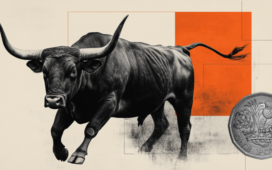When incoming Argentine President Javier Milei is inaugurated Sunday, his first order of business will be the economy.
The libertarian was first elected to public office just two years ago, and he quickly gained a national following as a congressman thanks to his virulent, anti-establishment rhetoric. He won the presidential runoff this fall with 56% of the vote, in part due to radical policy proposals like replacing Argentina’s national currency, the peso, with the U.S. dollar.
Why We Wrote This
The U.S. dollar has always carried a certain cache. But as Argentina considers adopting it as its official currency, the drawbacks of depending on the greenback are also coming into sharp relief.
Mr. Milei wouldn’t be the first Latin American leader to move toward dollarization – Panama, Ecuador, and El Salvador all officially use the U.S. currency. But their reasons for turning to the dollar have differed, and the dollar’s global stability isn’t always a long-term salve. Mr. Milei’s dollarization plan comes after years of money-printing in Argentina to finance expenditures, driving up inflation to a 30-year high. No matter what shape his economic policies take, Argentines are clamoring for stability.
“That’s why Milei was elected,” says Britta Crandall, who teaches political science at Davidson College and has written about dollarization. “It doesn’t necessarily have to be dollarization, but Argentines can’t live in chronically high inflation. It’s inordinately difficult. This was an easy election to say, ‘There’s one issue here,’ and prices were it.”
Each week, Buenos Aires grocer Jenny Contreras updates her price list, doing everything she can to keep costs low. That’s gotten increasingly difficult in recent years: Inflation is currently running at an annual 143%, and Ms. Contreras uses a chalkboard to let shoppers know the avocado they for late last month will cost them 12 cents more today.
Ms. Contreras, like many in Argentina, is exhausted by the country’s economic rollercoaster. She is allowing herself to hope that this weekend’s inauguration of incoming libertarian President Javier Milei might bring some relief, though she is skeptical about some of his more radical policy proposals.
“Things will improve because they have to improve,” she says.
Why We Wrote This
The U.S. dollar has always carried a certain cache. But as Argentina considers adopting it as its official currency, the drawbacks of depending on the greenback are also coming into sharp relief.
Mr. Milei was first elected to public office just two years ago and quickly gained a national following as a congressman thanks to his virulent, anti-establishment rhetoric. He won the presidential runoff with 56% of the vote, in part due to dramatic plans to close the Central Bank and replace the Argentine peso with the U.S. dollar.
His dollarization plan is designed to end years of money-printing to finance expenditures by successive governments, which has driven inflation to a 30-year high. It also taps into Argentina’s complex relationship with the greenback, which many here use both to save and to purchase durable goods, like cars and homes.
Mr. Milei wouldn’t be the first Latin American leader to move toward dollarization – Panama, Ecuador, and El Salvador all officially use the U.S. currency. But when Mr. Milei becomes president on Sunday, he will become the first leader seriously proposing dollarization in more than two decades.
“There’s one issue here”
Experts agree that regardless what path his government takes, the Argentine economy is the new government’s top priority.
“That’s why Milei was elected,” says Britta Crandall, who teaches political science at Davidson College in North Carolina and has written about dollarization. The solution “doesn’t necessarily have to be dollarization,” she says, “but Argentines can’t live in chronically high inflation. It’s inordinately difficult. This was an easy election to say, ‘There’s one issue here,’ and prices were it.”
Argentina has a long history with the dollar, although it has never officially dollarized its economy. For a decade starting in 1991, it pegged the peso to the U.S. dollar at a 1-to-1 rate. Many Argentines remember that period as a golden era, giving the idea of dollarization added luster today.
“It was a marvelous time,” says José Antonio Doval, a hairdresser in Buenos Aires. “Everyone was happy because we all earned well.”
But there are plenty of skeptics who recall that when the government began to print money to cover its budget deficit, the peso lost its parity with the dollar, and that when people tried to withdraw their dollar savings from the bank, they caused a bank run. Many Argentines lost their life savings in the currency crash.
“They closed all the banks. People were crying in the streets, begging the banks for their money,” recalls Javier Campo, a mechanic in Buenos Aires who is less enthusiastic about Mr. Milei’s dollarization proposal. The financial collapse in December 2001, which saw Argentina default on its sovereign debt, was followed by a political crisis when five presidents churned through office in the span of two turbulent weeks.
Seeking stability
“Dollarization has the huge benefit of providing Argentina with something it historically lacked – a stable currency,” says Eugenio Marí, chief economist at the conservative think tank Liberty and Progress Foundation.
“Unfortunately, our history shows that we will change laws to reduce the independence of the central bank,” Dr. Marí says, which has allowed governments to strong-arm the central bank into printing money.
“What’s the maximum independence we can give to our central bank? The central bank of another country,” such as the United States, he points out. But polls show that fewer than half of Argentines think dollarization is feasible or even desirable. For many, the question of sovereignty hangs heavy.
Latin America is the only region in the world where economies have fully dollarized – other than the small island nation of Palau in Oceania – partly because of trade and geography, says Dr. Crandall. Panama turned to the dollar in 1904 for political reasons. In Ecuador, an economic collapse led to its dollarization in 2000. And El Salvador followed its own path to the dollar a year later, as a stable economy looking to enhance trade with the U.S.
But “wanting a closer relationship with the U.S. is not common in Latin America right now,” says Dr. Crandall. “Many are looking more toward South-South diplomacy, relations with India, China, and others.”
Losing control
Nonetheless, the big-picture benefits of dollarization are obvious: Inflation dramatically decreased in Ecuador after dollarizing, and Panama, El Salvador, and Ecuador have all enjoyed price stability and low interest rates.
Ecuador’s case was arguably most similar to Argentina’s today – a society with little faith in its currency, where inflation was skyrocketing and purchasing power was diving. Ruth Arroyo recalls that from one day to the next, in her final semester of her doctorate studies in Quito, she watched her savings disappear as banks shuttered following widespread runs – and her university closed its doors entirely, causing her to lose years of academic credits.
“No government would even think about taking away our dollars today,” she says, now a retired professor after receiving a scholarship to relaunch her studies in the U.S. following Ecuador’s economic collapse.
Simple as dollarization may sound, its implementation is far from straightforward. “To dollarize, you need dollars, and precisely what Argentina lacks is dollars,” says Martín Burgos, economics department coordinator at the Floreal Gorini Cultural Center for Cooperation.
At the same time, when a government dollarizes its economy, it cedes all control over its monetary policy to the U.S. Federal Reserve. It cannot devalue its currency to win comparative trade advantages, for example.
“When an external crisis hits, dollarization can make it last longer,” says Simon Cueva, a former Ecuadorean finance minister who was in office for part of the pandemic.
“With COVID, many neighbors were able to devalue their currency quickly, while in Ecuador it was much more complicated,” he says.
Some blame the dollar for slower economic growth in Ecuador and El Salvador. And the spreading reach of international criminal organizations in the region poses new problems: Tucked between coca producers Colombia and Peru, Ecuador’s dollarized economy has become an appealing money-laundering destination.
Though Mr. Milei has claimed his flagship dollarization plan is “nonnegotiable,” his Cabinet appointments suggest a more pragmatic approach to the economy – at least in the short term.
Luis Caputo, a mainstream figure who has served as finance minister and Central Bank chief in past administrations, says that adopting the greenback is a “medium-term” objective.
Whatever form the currency stabilization ultimately takes, many – supporters and detractors alike – believe inflation will increase in the short term.
“Any stabilization and normalization program for the Argentine economy must adjust prices,” says Dr. Marí. And that, he warns, means continued inflation.




